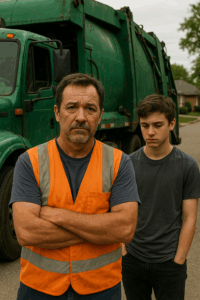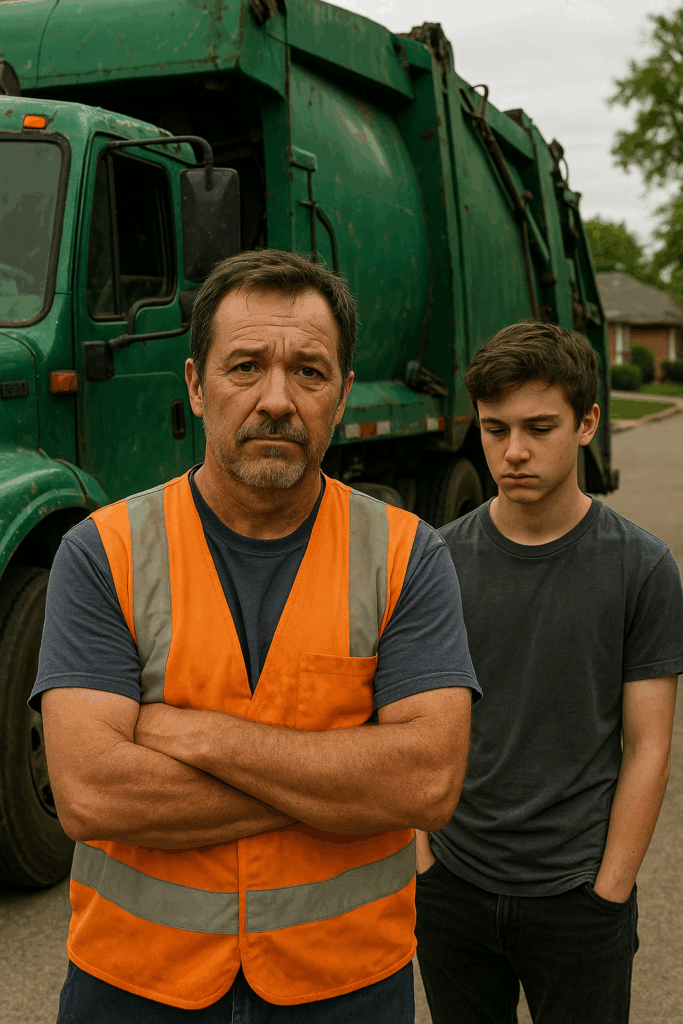My Son Hid the Truth About My Job—But On Career Day, Everything Changed
I’ve been driving a garbage truck for nearly two decades. It’s not glamorous work, but it’s honest. I wake up before dawn, climb into that big machine, and spend my mornings keeping the town clean. It’s a job most people don’t notice—until it’s not done. It pays the bills, puts food on the table, and gives my family a home.
For me, that was always enough.
Until the night before Kevin’s Career Day.
He was hunched over the kitchen table, working on a science project, when I casually mentioned, “Hey, bud, I’ll be there tomorrow to talk about my job. Should be fun, right?”
His pencil froze. He didn’t look up.
“Oh… you don’t have to come, Dad. It’s really no big deal.”
I tried to laugh it off, but his tone cut deep. “Why? You don’t want me there?”
He shifted in his chair. “It’s just… you work hard. You don’t need to take the time.”
He wouldn’t meet my eyes. That’s when it hit me: my son was embarrassed by me.
That night, I lay awake, staring at the ceiling. My hands were rough, my back ached, and my heart ached worse.
The classroom buzzed with excitement the next morning. Parents in sharp suits and polished shoes sat waiting to impress the kids. Lawyers, doctors, engineers—people with prestige.
I sat in the corner, my clean work shirt feeling like rags in comparison.
A man in a tailored suit leaned over and shook my hand. “You must be Kevin’s dad. He’s always talking about you.”
Pride swelled—until the man added, “He told us you run a waste management company. Impressive business!”
I froze. The words stung. Not because of the lie itself, but because my son had needed to tell it.
Before I could respond, the teacher clapped her hands. “Next, Kevin’s father! Please come up.”
My stomach dropped. Kevin’s face went crimson, his eyes glued to his desk. I could feel the weight of his shame pressing down on me.
At that moment, I had two choices: protect his lie… or tell the truth.

I walked to the front, each step heavier than the last. My palms were slick, but my voice came out clear.
“I don’t own a company,” I began. The room fell quiet. Kevin’s head sank lower.
“I drive a garbage truck.”
Murmurs rippled through the room. Some kids giggled, others glanced at each other.
I steadied my breath. “I know—it doesn’t sound exciting. But let me tell you something. Without sanitation workers, this town would be buried in trash. Without people willing to do what I do, disease would spread, the streets would stink, and none of you could enjoy your neighborhoods the way you do.”
I paused, scanning the room. “My job may not come with a suit. But it matters. And I’m proud of it.”
Still silence. Kevin’s shoulders hunched, as if bracing for laughter.
Then, a small hand shot up. “Do you really drive the huge truck with the claw arm?”
I smiled. “Every day.”
Another kid blurted, “Can you crush a couch with it?”
“Absolutely. You should hear the sound it makes.”
The room erupted in gasps and laughter. Suddenly, I wasn’t “the garbage man.” I was the guy with the giant truck, the crusher of mountains of junk, the one who honked early in the morning for kids on my route.
By the time I finished, little hands were waving in the air with questions, and the teacher’s eyes shimmered.
I ended simply: “Whatever you grow up to be—doctor, teacher, builder, or driver—be proud of your work. Do it with heart. That’s what truly matters.”
When I sat down, my hands were still trembling. But then—Kevin tugged at my sleeve. His eyes were watery, his face red.
“I’m sorry, Dad,” he whispered. “I just… I didn’t want them to laugh at me.”
My throat tightened. I pulled him close and whispered back, “Son, you never have to be ashamed of me. Ever.”
Something shifted that day.
On the way home, Kevin asked a dozen questions about the truck. Weeks later, he proudly told his classmates that his dad didn’t just drive any vehicle—he drove “the city’s biggest, loudest, strongest machine.”
One afternoon, I found a drawing taped to his wall. It was me, in my uniform, standing beside a massive green truck. Above it, in bold letters, he had written: MY HERO.
That was the moment I realized: dignity isn’t measured in titles or suits. It’s measured in the pride you take in your work, and the love you pour into your family.
And if you ask Kevin now, he’ll tell you: his dad doesn’t just drive a garbage truck. He drives the heartbeat of the city.
This version builds suspense (the father’s dread and the son’s shame), sharpens the emotional climax (the speech), and lands with a touching, thoughtful ending that resonates


